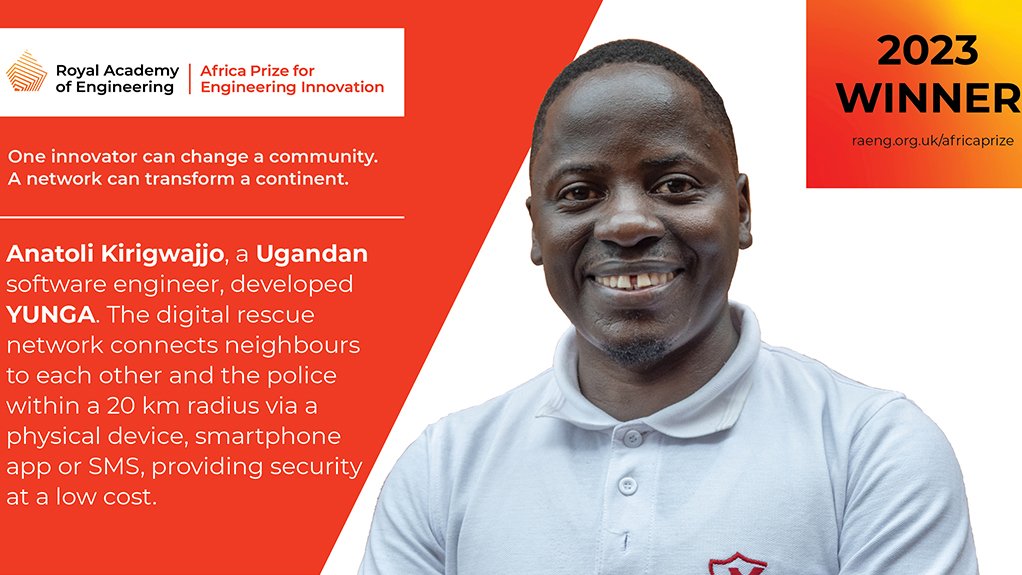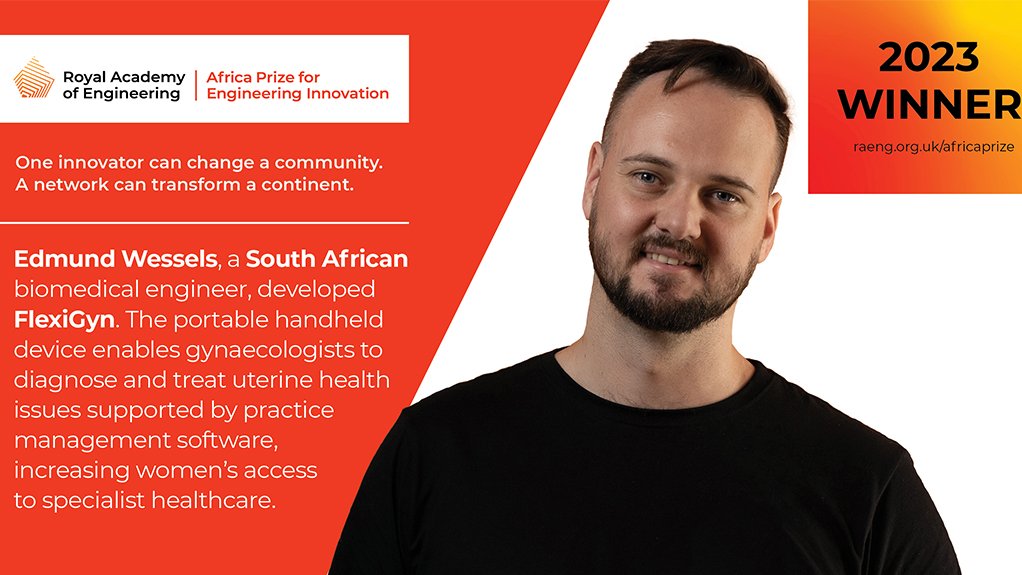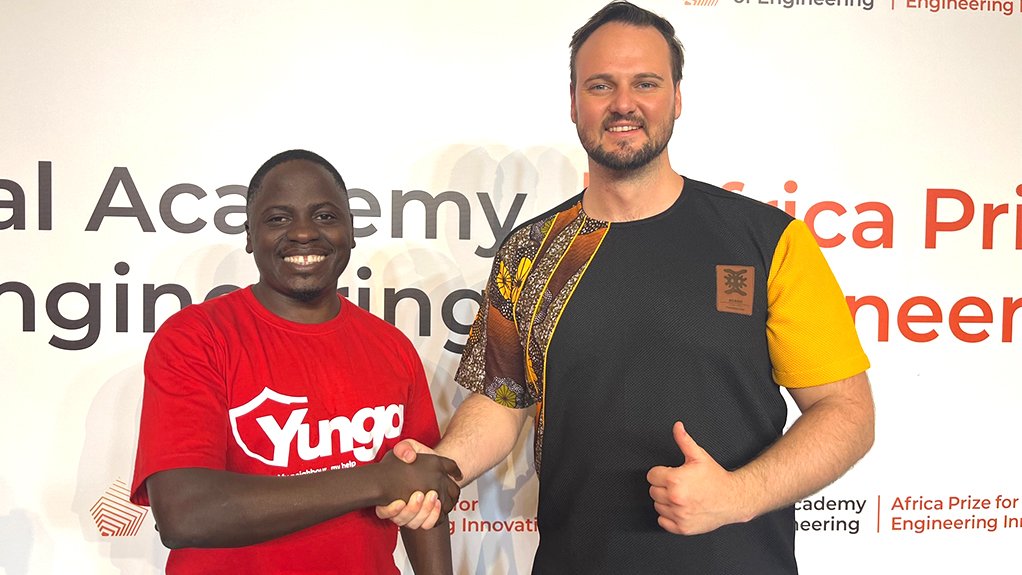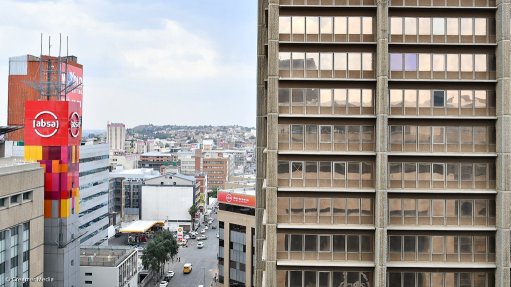South African, Ugandan entrants win Africa Prize for Engineering Innovation




Nearly 1 000 households in 30 communities across central Uganda are already on the YUNGA network, which has successfully prevented around 130 break-ins and related crimes
The FlexiGyn features a flexible scope with built-in light and camera, offering a more comfortable and efficient experience for both patients and healthcare providers
The Africa Prize for Engineering Innovation is Africa’s biggest prize dedicated to supporting and upscaling engineering innovation
South African biomedical engineer Edmund Wessels and Ugandan electrical engineer Anatoli Kirigwajjo have jointly won the Royal Academy of Engineering’s 2023 Africa Prize for Engineering Innovation.
Wessels won the award with FlexiGyn, a battery-powered, portable handheld device that enables gynaecologists to diagnose and treat women’s uterine problems without anaesthetic or expensive equipment.
It is aimed at increasing women’s access to reproductive healthcare, particularly in remote areas.
Typical hysteroscopy systems are rigid, leading to high levels of patient discomfort, and require bulky additional equipment for visualisation. The innovative FlexiGyn features a flexible scope with built-in light and camera, offering a more comfortable and efficient experience for both patients and healthcare providers.
“My co-founder, Chris Meunier and I aim to bring healthcare to a woman’s doorstep, precisely when and where they need it. FlexiGyn is portable, intuitive and user-friendly, allowing gynaecologists to offer quality screenings and timely interventions regardless of the patient’s location or lack of medical infrastructure. At the same time, it is designed to minimise discomfort,” says Wessels.
“We are excited beyond belief to win the Africa Prize and know that this will help to get our name out and find the right partners to complete FlexiGyn’s journey,” he adds.
In addition to the hardware, Wessels and his team are developing integrated software solutions that seamlessly connect the FlexiGyn device with existing medical practice systems. This includes obstetricians and gynaecologists to general practitioners, significantly increasing the frequency of diagnoses.
Streamlining patient scheduling, electronic health record synchronisation and artificial intelligence-assisted diagnosis, this improved efficiency and collaboration enable healthcare professionals to diagnose and treat patients more frequently, enhancing the overall quality of care.
“Winning the Africa Prize enhances our purpose to make women’s healthcare convenient and accessible. The more visibility we get, the more likely others will start to innovate in this space too, solving problems for the people who need it most,” says Wessels.
Kirigwajjo, meanwhile, entered the competition with the YUNGA innovation – a local digital security network that connects neighbours to each other and police within a 20 km radius through a physical device, smartphone app or SMS service, providing security at low cost.
Nearly 1 000 households in 30 communities across central Uganda are already on the YUNGA network, which has successfully prevented about 130 break-ins and related crimes.
The team is aiming to connect 32 000 households across Uganda in the next two years.
“I developed YUNGA after losing $1 300 worth of assets in a break-in, with little chance of the thieves being caught. We hope that with our household networks, communities will become harder targets for criminals. This will ensure safety, which, in turn, will create the space for economic activities to thrive,” enthuses Kirigwajjo.
He and his co-founders, Kawesa Nasser and Kasoma Fredrick, say that winning the Africa Prize will give their business exposure in new markets across Africa.
“It will open the door to additional resources such as investments and stakeholder partnerships. The prize money will allow us to add more than 1 000 households to the YUNGA network, with a focus on women-led homes, which are more vulnerable to crime in low-resource settings. This is an invaluable opportunity in our efforts to scale up,” adds Kirigwajjo.
In the YUNGA network, communities are divided into networks of 10 to 30 households, each receiving a device connected to a local area network. In cases of emergency, pressing a button sets off a loud alarm on all devices connected to the network, and sends a message with the victim’s details to other devices, prompting a community response.
The system includes motion sensors for when users leave their homes or businesses.
YUNGA also operates in areas with no Internet connectivity through a long-range wide area network. It also reduces response times by hours to the shortest time possible for members of the network to reach someone in danger.
“YUNGA revolutionises communication in low-resource areas, providing a digital network for swift and efficient responses to crimes, enhancing safety for entire communities. YUNGA aims to reach more than 30 000 households and 150 000 individuals by 2025,” says Kirigwajjo.
“The Africa Prize programme has already helped us become more investment-ready, raise capital, improve and market our product, and grow our customer base by almost 60%.”
Wessels and Kirigwajjo have each been awarded first prize for the Africa Prize for engineering innovation, taking home £25 000 to further develop their products.
The Africa Prize for Engineering Innovation, founded by the Royal Academy of Engineering, is Africa’s biggest prize dedicated to supporting and upscaling engineering innovation. After nine years, the programme has a proven track record of identifying successful engineering entrepreneurs.
Since 2014, the programme has supported more than 130 entrepreneurs across 20 African countries, with a rigorous business training programme and lifelong project support through the Africa Prize alumni network.
More than 70% of the alumni’s engineering and technology businesses now generate revenue. Between them, the Africa Prize alumni have raised more than $14-million in grants and equity funding, and created more than 3 600 jobs, almost half of them for women.
Article Enquiry
Email Article
Save Article
Feedback
To advertise email advertising@creamermedia.co.za or click here
Press Office
Announcements
What's On
Subscribe to improve your user experience...
Option 1 (equivalent of R125 a month):
Receive a weekly copy of Creamer Media's Engineering News & Mining Weekly magazine
(print copy for those in South Africa and e-magazine for those outside of South Africa)
Receive daily email newsletters
Access to full search results
Access archive of magazine back copies
Access to Projects in Progress
Access to ONE Research Report of your choice in PDF format
Option 2 (equivalent of R375 a month):
All benefits from Option 1
PLUS
Access to Creamer Media's Research Channel Africa for ALL Research Reports, in PDF format, on various industrial and mining sectors
including Electricity; Water; Energy Transition; Hydrogen; Roads, Rail and Ports; Coal; Gold; Platinum; Battery Metals; etc.
Already a subscriber?
Forgotten your password?
Receive weekly copy of Creamer Media's Engineering News & Mining Weekly magazine (print copy for those in South Africa and e-magazine for those outside of South Africa)
➕
Recieve daily email newsletters
➕
Access to full search results
➕
Access archive of magazine back copies
➕
Access to Projects in Progress
➕
Access to ONE Research Report of your choice in PDF format
RESEARCH CHANNEL AFRICA
R4500 (equivalent of R375 a month)
SUBSCRIBEAll benefits from Option 1
➕
Access to Creamer Media's Research Channel Africa for ALL Research Reports on various industrial and mining sectors, in PDF format, including on:
Electricity
➕
Water
➕
Energy Transition
➕
Hydrogen
➕
Roads, Rail and Ports
➕
Coal
➕
Gold
➕
Platinum
➕
Battery Metals
➕
etc.
Receive all benefits from Option 1 or Option 2 delivered to numerous people at your company
➕
Multiple User names and Passwords for simultaneous log-ins
➕
Intranet integration access to all in your organisation




















